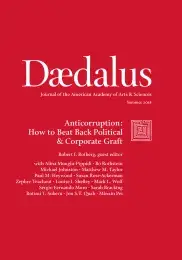Getting to Accountability: A Framework for Planning & Implementing Anticorruption Strategies
A key lesson from historical examples of anticorruption successes and failures is that bursts of anticorruption policy seldom develop into lasting shifts in the overall corruption equilibrium if these policies are not embedded in a broader accountability effort. This essay draws on past examples of anticorruption success to develop an accountability framework that can be broadly applied across a number of sectors and contexts. This essay further proposes an iterative, strategic approach that uses the basic structure of this accountability equation to guide anticorruption efforts in order progressively to eliminate bottlenecks to effective accountability.
Corruption is a complex problem with enormous political salience. It is therefore not surprising that the solutions academics proffer for addressing corruption–long-term structural remedies that may not mature for decades or quick solutions that are almost certain to founder as they are battered against preexisting political conditions–frequently leave policy-makers dissatisfied.
The first approach to combating corruption begins from the premise that it has deep and structural roots in culture, social inequality, and the (un)rule of law.1 Effectively targeting corruption when structure is the driver requires a “big bang,” a critical juncture, or a historical turning point momentous enough to pull a country off its current path. Describing the Korean, Japanese, and Finnish cases, political scientists Eric Uslaner and Bo Rothstein have suggested that external stimuli from the Japanese occupation, American postwar occupation, and the Soviet threat led all three countries to invest heavily in education as a means of nation-building. Given the strong ties . . .
